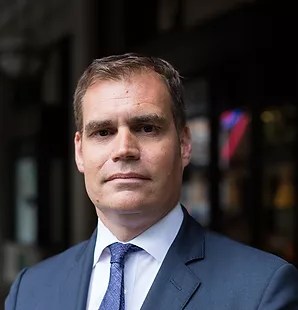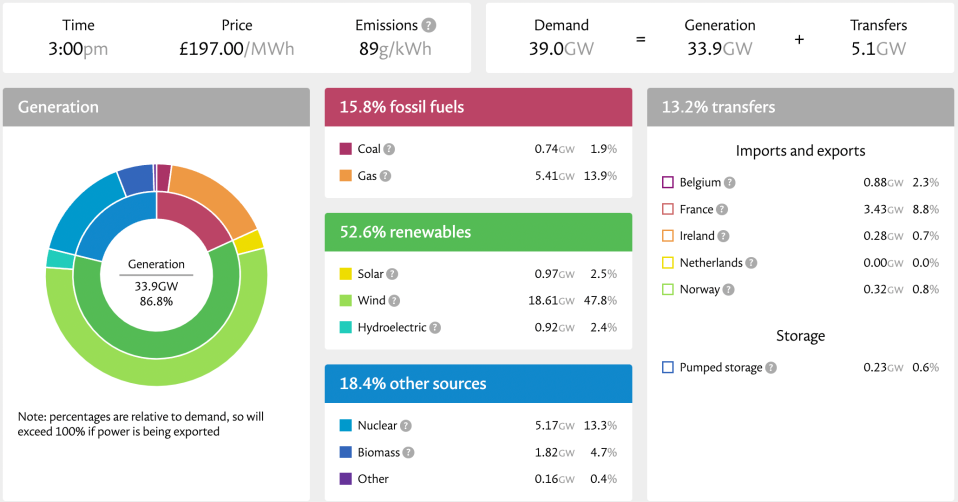Nuclear boss urges govt to back small modular reactors with ‘pace and urgency’

The head of the UK’s leading nuclear body has urged the government to pursue small modular reactors (SMRs) with “pace and urgency”, amid reports of a funding delay with ministers squabbling over the cost of the country’s energy ambitions.
Tom Greatrex, chief executive of the Nuclear Industry Association (NIA), told City A.M. that the UK needed to develop a pipeline of projects to ramp up nuclear power in line with the government’s energy security projects.
He said: “Proceeding with pace and urgency will not only make power more reliably and predictably priced, but it will also mean that UK technology will create long term, high quality jobs and export opportunities from which the country will benefit.”

This would mean nuclear power generated 25 per cent of the UK’s energy demand, with former Prime Minister Boris Johnson establishing plans for the UK to build eight new reactors this decade.
Currently, the UK’s ageing nuclear fleet makes up around 15 per cent of the country’s energy generation, but the remaining five power plants are set to be shut down by the middle of the next decade.
With the UK needing to bump up capacity quickly, Greatrex was convinced the UK could become “a global leader” in SMRs.
He believed that they could supplement renewables and a larger nuclear fleet and strengthen the UK’s energy security.
Greatrex said: “There is no doubt that the UK can be a global leader in SMR. Working alongside larger reactors and renewables, they will provide a vital source of reliable, clean power, essential to reducing our reliance on burning volatile fossil gas for power, heat and transport – while simultaneously strengthening UK energy security.”
The NIA boss has previously urged the government to speed up announcements for new projects, with Sizewell C still awaiting a final investment decision and Hinkley Point C’s completion delayed two years to 2027.
Nuclear projects stall as Government dithers
The industry chief’s latest comments follow reports – first covered in The Times – that ministers have so far not been able to agree a funding deal for small modular reactors.
The government is now not expected to confirm funding plans for at least another 12 months, with Whitehall worried about the spiralling costs involved in Britain’s wider nuclear ambitions.
Its concerns come with growing expectations Hinkley Point C will come in over budget at £26bn – orginally projected at £18bn – while the fee for Sizewell C has been estimated between £20-35bn.
The government has previously announced the creation of Great British Nuclear (GBN) to deliver the next generation of reactors and SMRs.
The body will be overseen by experienced nuclear specialist Simon Bowen and launch later this year.
So far, the government has failed to confirm any other future sites for nuclear projects – despite rumours linking to projects at sites in Wales such as Wylfa and Trawsfynydd.
Greatrex’s calls for a rapid rollout of SMRs were shared by industry expert Dr Peter Bird, managing director at energy specialist Berkeley Research Group.
He told City A.M. that while the benefits of SMRs needed to be proven due to their lack of development compared to conventional reactors in the UK, public funds were essential to building the necessary scale to make them effective.
Dr Bird said: “SMRs are an important part of the strategy, principally because they raise the prospect of faster deployment and economies of scale, based on a factory production line. Substantial financial support from the government is essential if SMRs are ever to be ready for deployment.”
| Energy Source | Generation Capacity | Generation Target | Date |
| Solar | 14GW | 70GW | 2035 |
| Offshore Wind | 11GW | 50GW | 2030 |
| Nuclear | 7GW | 24GW | 2050 |
| Hydrogen | <1GW | 10GW | 2030 |
Rolls-Royce, the potential leading player in domestic SMRs, announced its final shortlist its proposed nuclear pipeline of small modular reactors last month.
Its three sites include the International Advanced Manufacturing Park (IAMP) in South Tyneside, Teesworks in Teesside and Gateway in Deeside.
A decision on the location is expected to be made this year following final evaluations.
Its designs are for a 470MW plant at a cost of around £2bn – each site powering one million homes.
SMRs are constructed in factories and are transported to construction sites, making them cheaper and quicker to build.
Rolls-Royce confirmed to City A.M. it is progressing through the regulatory consent process for its designs, and believed it was making “strong progress” with its SMR plans.
A spokesperson said:“We are ready to enter into negotiations with the government and, If we can agree a route forward within a reasonable timeframe, we could start building British factories, commissioning supply chain contracts and agreeing export deals abroad before the next general election.”
Rolls-Royce could face SMR competition
The government is currently supporting Rolls-Royce’s SMRs – which could be built at dozens of locations across the UK – with £210m in funding to back the first project.
However, considerably more resources would be needed to build the 30 SMRs targeted by Rolls-Royce and its consortium of investors.
The Treasury is reportedly not prepared to sign off on any orders or significant funding until the technology had approval from the Office for Nuclear Regulation, which is not expected until 2024.
It is now looking at whether to boost competition by opening the bidding to rival plans from other companies such as GE Hitachi.
There are also proposals for thorium-based SMRs, proposed by Copenhagen Atomics, which has submitted its UK reactor design for approval.

Thomas Steenberg, chief executive, told City A.M.: “We are providing a radical different technology and that enables us to deliver at a price point of £40 MWh levelised cost energy, which is a very strong price for baseload energy supply”
The prospect of more competition has been welcomed by Andy Mayer, energy analyst at free market think tank The Institute for Economic Affairs.
He told City A.M. that if the government is truly concerned about costs, it needs to “remove the regulatory barriers delaying deployment, and encourage competition” rather than “pick winners through bespoke subsidy schemes for individual projects, technologies, and firms.”
Mayer said: “If the government wants a national nuclear champion on the French model, it will need to write vast blank cheques, now and forever, gambling that the investment will deliver a technology others wish to buy. This approach was tried in the 20th century. It failed, and we are still paying £3bn a year as a result.”
City A.M. has approached the government for comment.